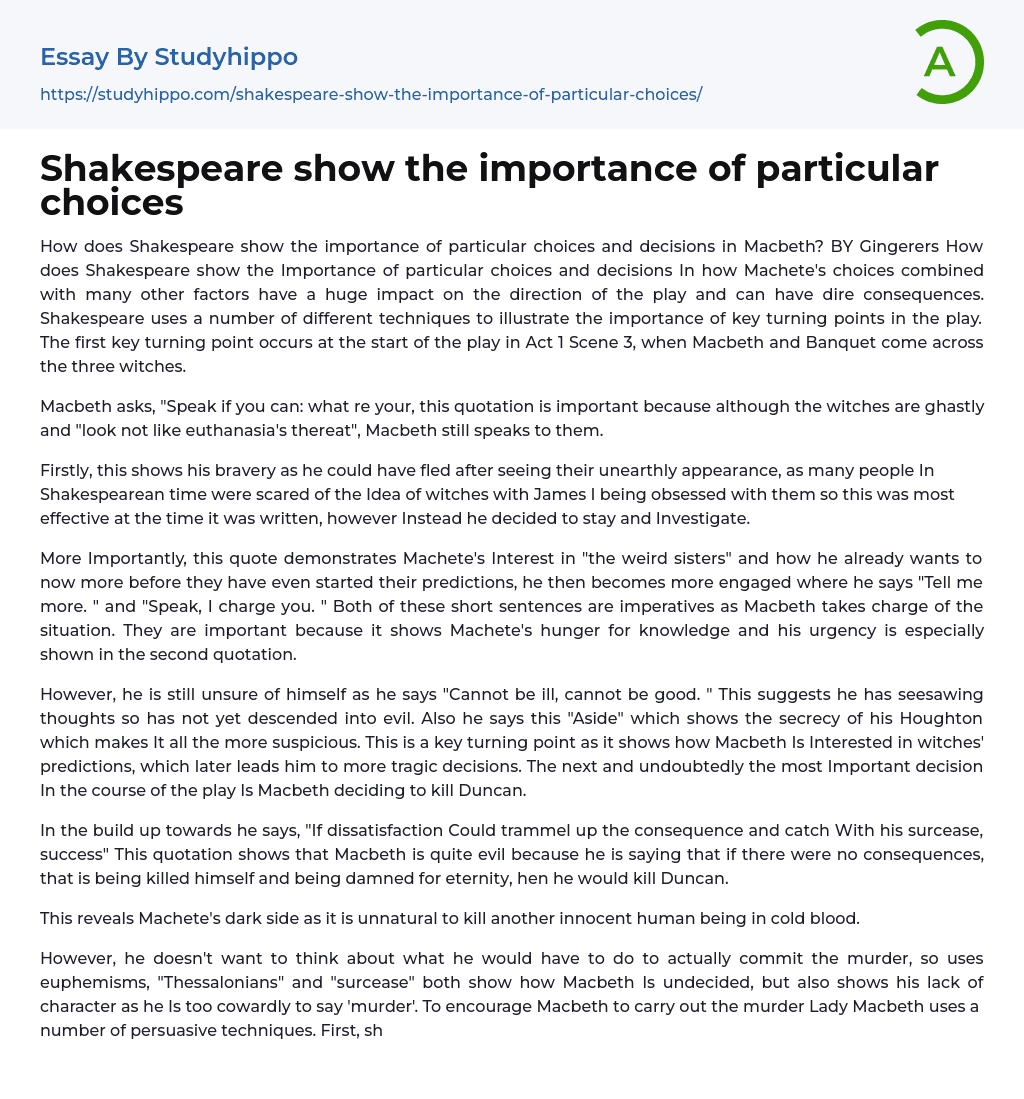

Shakespeare show the importance of particular choices Essay Example
In Macbeth, Shakespeare portrays how particular choices and decisions can have a significant impact on the direction of the play and lead to dire consequences. Through various techniques, he emphasizes the importance of key turning points. In Act 1 Scene 3, Macbeth's encounter with the three witches is a crucial moment. Despite their ghastly appearance, Macbeth displays bravery by speaking to them instead of fleeing. This action was especially significant as many people during Shakespearean times were afraid of witches and James I was obsessed with them. Furthermore, Macbeth's interest in the witches is evident when he asks them to speak and becomes increasingly engaged with their predictions through commands like "Tell me more" and "Speak, I charge you." These imperatives demonstrate Macbeth taking charge of the situation and indicate the pivotal nature of his choices.The importance of the q
...uotes lies in Machete's hunger for knowledge and his urgency, which is particularly evident in the second quotation. Despite his uncertainty, expressed through the statement "Cannot be ill, cannot be good," Machete's seesawing thoughts suggest he has not yet fully turned to evil. The phrase "Aside" highlights the secrecy surrounding his thoughts and adds a suspicious note to the situation. This turning point highlights Macbeth's interest in witches' predictions, ultimately leading him towards further disastrous decisions, including the decision to kill Duncan. Ahead of this decision, Macbeth's statement "If dissatisfaction could trammel up the consequence and catch with his surcease, success" exposes his darker side, as he reveals that he would kill Duncan if there were no negative consequences to his actions. Macbeth's lack of courage is further emphasized through the use of euphemisms, such as
"Thessalonians" and "surcease." Lady Macbeth employs a variety of persuasive techniques to encourage Macbeth to commit the murder.In the first quote, she questions Macbeth's masculinity and accuses him of cowardice, insulting his virility as he's a soldier. The second quote shows her own evilness as she compares her hard-heartedness to his weakness by describing killing a baby. This portrays Duncan's innocence and purity, reflecting on his murder. The graphic nature of the quote emphasizes her desire to become Queen by any means possible. However, in the third quote, she changes tactics and encourages Macbeth to stay brave and optimistic. The audience learns of Macbeth's decision to kill Duncan through his soliloquy where he hallucinates seeing a dagger before him, reflecting his guilt but still planning on doing it.This is a significant moment in Macbeth's story as it takes him seven scenes to finally commit the murder of Duncan, highlighting its importance. The next major turning point is when Macbeth decides to have Banquo and Fleance killed, as he fears his own descendants will not inherit the crown. Macbeth acknowledges his lack of heirs and negative association with the crown, saying "Upon my head they placed a fruitless crown And put a barren scepter in my gripe." Macbeth's decision to have Banquo and Fleance assassinated also highlights his weak character as he does not carry out the deed himself, but rather hires murderers. In lines 77-89, Macbeth speaks to the murderers colloquially, showing his sense of urgency and need to get the job done quickly. This use of alliteration emphasizes Macbeth's knowledge that his actions are dreadful. Shakespeare uses these literary techniques to convey the gravity
and significance of these key events in the play.The turning points in Macbeth showcase his progression towards a ruthless mindset. His willingness to continue killing is evident in his statement, "I am in blood Stepped in so far that should I wade no more, Returning were as tedious as go o'er." This lack of fear of murder is further reinforced when Macbeth jokes, "Had I three ears, I'd hear thee," while speaking to the witches. Despite their reputation for dishonesty, Macbeth believes in the witches' prophecy that "none of woman born Shall harm Macbeth," instilling him with even more confidence, leading to his eventual downfall. Returning to the witches is a pivotal moment as it ultimately results in his death. Shakespeare portrays how a good man can be corrupted by poor choices, weak character and the ambition of others. Using various techniques, he emphasizes these markers, highlighting their connections and showing how they can lead to tragic consequences in a short space of time.
- Banquo essays
- Macbeth Ambition essays
- Adaptation essays
- Adventure essays
- Adversity essays
- Aging essays
- Alcohol essays
- Barbie Doll essays
- Beauty essays
- Care essays
- Carpe diem essays
- Change essays
- Chess essays
- Chicken essays
- Choices essays
- Contrast essays
- Crops essays
- Development essays
- Dream essays
- Evil essays
- Experience essays
- Family essays
- Farm essays
- Fire essays
- First Love essays
- Focus essays
- Greed essays
- Hero essays
- Holiday essays
- House essays
- Housing essays
- Humility essays
- Humor essays
- Hypocrisy essays
- Integrity essays
- Law of Life essays
- Life Changing Experience essays
- Life Experience essays
- Lifestyle essays
- Limitations essays
- Love Story essays
- Mother Tongue essays
- Motherhood essays
- My Neighborhood essays
- Myself essays
- Mystery essays
- Narcissism essays
- Never Give Up essays
- Nursing essays
- Object essays



